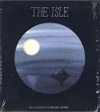 Vastness of an ocean or shallowness of a bathtub? The Islewas quietly put on a musical map by Japanese cartographers P-Vine backin April, joining the ranks of sea-themed concept albums such as PianoMagic's A Trick of the Sea and Rachel's The Sea and the Bells(diaries of aquatic adventures, scrupulous accounts of seasickness,logbooks of navel/naval gazing). Unlike its conceptual predecessors,the creators of The Isle do not go after the epic and theexpansive but aim for the childish and the minimal: a fairy tale. It'sa split album cleverly disguised as a collaboration. Tokyo's SohichiroSuzuki (World Standard) and Cologne's Jörg Follert (Wechsel Garland,Wunder, 1/3 of Visor) each contributed seven compositions and'co-wrote' only the title track, swapping ideas via mail. On firstencounter, Suzuki's and Follert's previous efforts seem more satisfyingthan this. Through their infantile melodies and simplisticarrangements, the musicians channel not the vastness and deepness ofthe sea but the rather comfortable confines of a washbasin. A faintasthmatic wheeze of a rubber ducky at the end of the first trackreinforces this impression. Subsequent listens, however, reveal a muchricher palette of mood, harmony and texture, full of subtleties thatwere not apparent initially. Acoustic guitars, xylophones, toy pianos,melodicas and violins (most of the string parts masterfully played byan uncredited Susanna Welsch) are weaving a patchwork of pointillistwaltzes, plinky bossa-novas, mournful ambient vignettes, and even oneharpsichord-driven ballad beautifully sung (in German) by Follert, "TheHarbour," which, incidentally, is the only vocal piece on the album.The result is not a heavy-lidded Odyssey but rather a Treasure Islandas enacted by talented carefree kids, wearing oversized Hessian bootsand paper cocked hats, with prop parrots perched on their narrowshoulders and plastic spyglasses pressed firmly to their wide-openeyes. This is Visine-washed music, clear and bright. The latitude andlongitude of The Isle may be different from the ambientbanjoisms of World Standard's Country Gazette or cinematic dubisms ofWechsel Garland's Liberation von History but it confidently stands onits own in the murky sea of this year's music. The last harbor for theLost Children.
Vastness of an ocean or shallowness of a bathtub? The Islewas quietly put on a musical map by Japanese cartographers P-Vine backin April, joining the ranks of sea-themed concept albums such as PianoMagic's A Trick of the Sea and Rachel's The Sea and the Bells(diaries of aquatic adventures, scrupulous accounts of seasickness,logbooks of navel/naval gazing). Unlike its conceptual predecessors,the creators of The Isle do not go after the epic and theexpansive but aim for the childish and the minimal: a fairy tale. It'sa split album cleverly disguised as a collaboration. Tokyo's SohichiroSuzuki (World Standard) and Cologne's Jörg Follert (Wechsel Garland,Wunder, 1/3 of Visor) each contributed seven compositions and'co-wrote' only the title track, swapping ideas via mail. On firstencounter, Suzuki's and Follert's previous efforts seem more satisfyingthan this. Through their infantile melodies and simplisticarrangements, the musicians channel not the vastness and deepness ofthe sea but the rather comfortable confines of a washbasin. A faintasthmatic wheeze of a rubber ducky at the end of the first trackreinforces this impression. Subsequent listens, however, reveal a muchricher palette of mood, harmony and texture, full of subtleties thatwere not apparent initially. Acoustic guitars, xylophones, toy pianos,melodicas and violins (most of the string parts masterfully played byan uncredited Susanna Welsch) are weaving a patchwork of pointillistwaltzes, plinky bossa-novas, mournful ambient vignettes, and even oneharpsichord-driven ballad beautifully sung (in German) by Follert, "TheHarbour," which, incidentally, is the only vocal piece on the album.The result is not a heavy-lidded Odyssey but rather a Treasure Islandas enacted by talented carefree kids, wearing oversized Hessian bootsand paper cocked hats, with prop parrots perched on their narrowshoulders and plastic spyglasses pressed firmly to their wide-openeyes. This is Visine-washed music, clear and bright. The latitude andlongitude of The Isle may be different from the ambientbanjoisms of World Standard's Country Gazette or cinematic dubisms ofWechsel Garland's Liberation von History but it confidently stands onits own in the murky sea of this year's music. The last harbor for theLost Children.samples:
Read More

